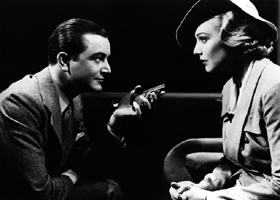

UK suspense
1936
bw 86 min.
Director: Alfred Hitchcock
CLV: $29.95 - available
1 disc, catalog # CC1118L
VHS: available from Home Vision Cinema
 Secret Agent (1936) came to life in the prime of Alfred
Hitchcock's British period. It arrived between the popular triumph of
The Thirty-Nine Steps and the box-office rejection of
Sabotage, a more daringly downbeat work. Secret Agent
partakes of the lighthearted comedy of the former and the bitter irony
of the latter. It is luxuriously cast -- John Gielgud, Madeleine
Carroll, Peter Lorre, Robert Young -- and peppered with the kind of
ingenious set pieces that became Sir Alfred's trademark.
Secret Agent (1936) came to life in the prime of Alfred
Hitchcock's British period. It arrived between the popular triumph of
The Thirty-Nine Steps and the box-office rejection of
Sabotage, a more daringly downbeat work. Secret Agent
partakes of the lighthearted comedy of the former and the bitter irony
of the latter. It is luxuriously cast -- John Gielgud, Madeleine
Carroll, Peter Lorre, Robert Young -- and peppered with the kind of
ingenious set pieces that became Sir Alfred's trademark.
The
scenario is an ambitious web of double identity and double
meaning. Edgar Brodie (Gielgud) is a British novelist-turned-spy who
travels to Switzerland during World War I under the name of Richard
Ashenden. With him are a fictional wife, Elsa Carrington (Carroll),
and an eccentric hired assassin known as "the General" (Peter
Lorre). Their mission is to find and kill a German spy, but first they
must guess who he is.
Each principal character is defined by his or
her entrance. Brodie/Ashenden emerges from a doorway enshrouded in
shadow, a mark of his double nature: novelist and spy, idealist and
conspirator. The General appears at the bottom of a staircase, shot
from overhead as if ascending from hell, announced by a young girl's
cry. Lorre's notoriety as the murderer in Fritz Lang's M
assured him of the role -- and with it a chance to steal scene after
scene.
When Caypor appears, the yelp of his little dog warns of
impending danger. Robert Marvin (Robert Young) is seen from behind
with a bunch of grapes hovering overhead -- evoking Dionysus, Greek
god of wine and symbol of sensuality. Indeed, he is working hard to
seduce Elsa, a flighty flirt who materializes straight-away with a
face full of cold cream. In the playful mood, Hitchcock told a British
newspaper he used the cold cream merely to deprive Carroll of her
dignity. Typically, he concealed his deeper motive: undercutting her
at the outset to underscore her growth into the moral center of the
film.
Hitchcock loved exotic locales. Switzerland, where he and
Alma Reville shared their honeymoon, was one of his favorites. The
Swiss "have milk chocolate," he told Francois Truffaut, "they have
the Alps, they have village dances, and they have lakes." In Secret
Agent all these harmless things take on sinister double meanings:
a chocolate bar conceals spy-to-spy memos. The Alps become the scene
of the tragic murder. The victim's mistaken identity is revealed at a
village dance, prompting a marital battle and reconciliation on the
water between the two spies who aren't even married. Hitchcock never
could resist water imagery as an hydraulic engine of passion.
The
murder, of course, is the pivotal event. It gives Secret Agent
the ominous undertow that repulsed early audiences and fascinates us
today. Ashenden, banished along with his double to a distant
conservatory by the impatient General, watches helplessly through a
spyglass as the results of his bungling unfold on an Alpine hiking
trail. Like James Stewart in Rear Window, like the audience
itself, he learns to feel the guilty compulsion of the voyeur. He
learns what it's like to be Alfred Hitchcock: to stand behind the lens
and see his dark dreams realized. Angst-ridden. Removed from the
action, yet responsible for the carnage.
Madeleine Carroll, caressed
by the camera, becomes the moral backbone of the film, the
conscientious objector. The heroine's newfound resolve overwhelms the
weakening impulses of the hero. Love blooms and momentarily softens
the grim juggernaut of the plot. However, duty calls Ashenden and the
General to the chocolate factory where they unmask the spy. A vintage
train scene consummates the story.
Secret Agent has many of the hallmarks of quintessential
Hitchcock: the tension between comedy and tragedy, the ambiguous moral
scheme, the wealth of visual signifiers. The director never rated the
film highly -- yet it is impossible to watch it and remain
unmoved.
-- MARK FLEISCHMANN
Credits
Director: Alfred
Hitchcock
Screenplay: Charles Bennett
From the play by: Campbell
Dixon
Based on the novel Ashenden by: W. Somerset
Maugham
Photography: Bernard Knowles
Dialogue: Ian
Hay
Continuity: Alma Reville
Art Director:
O. Werndorff
Editor: Charles Frend
Musical Director: Louis
Levy
Transfer
This edition of Secret Agent was
transferred from the best 35mm master print known to exist.





